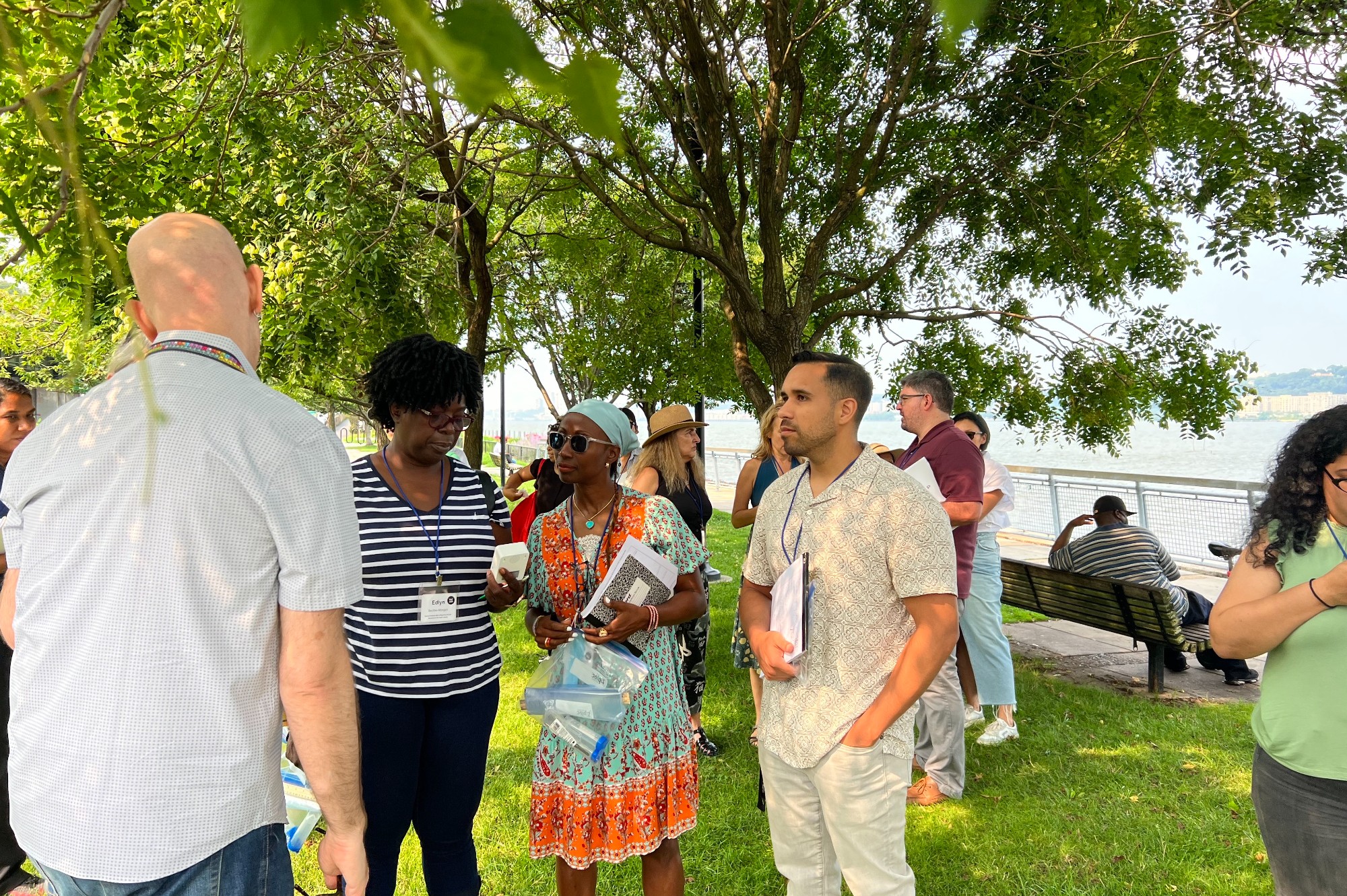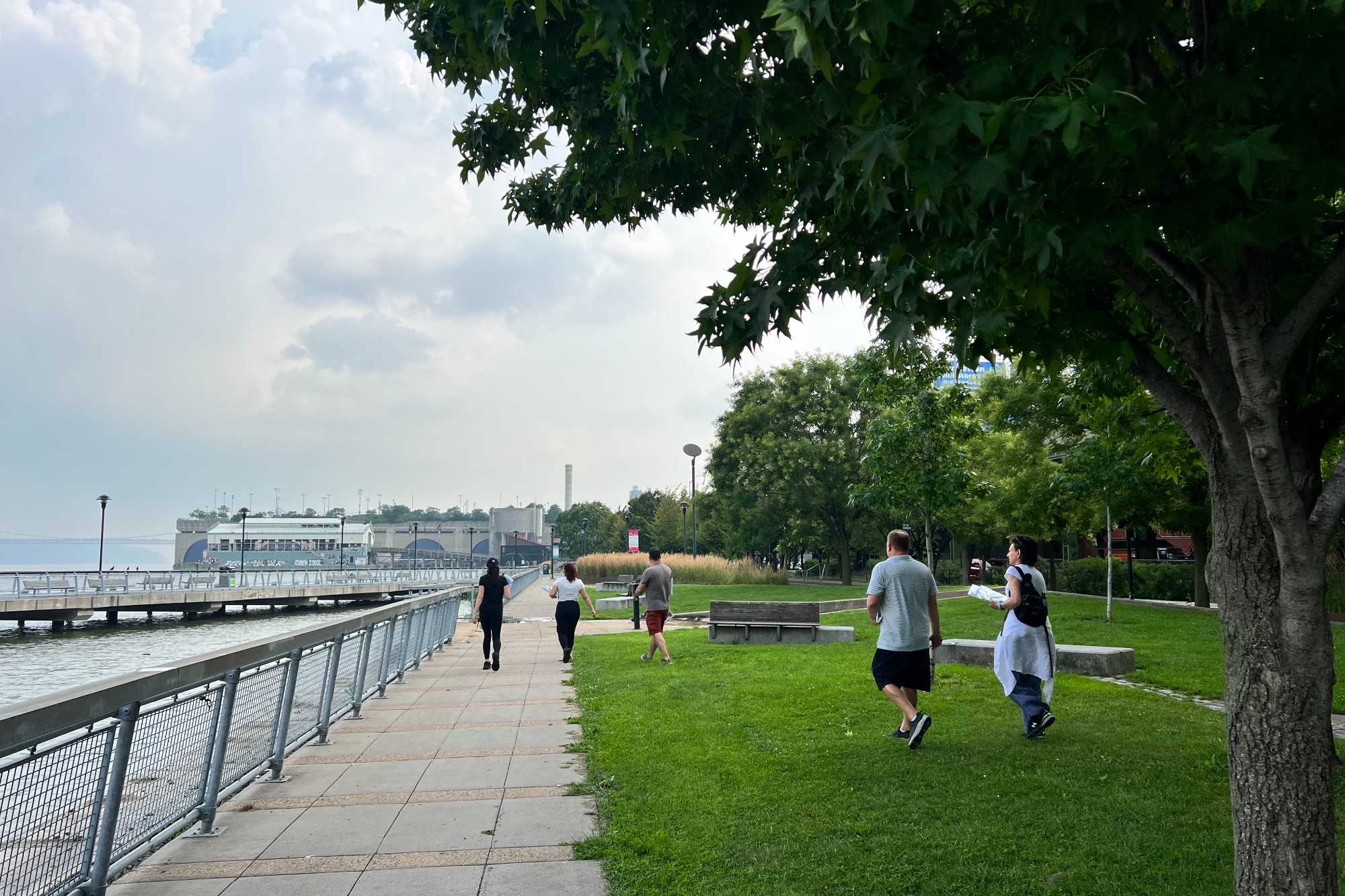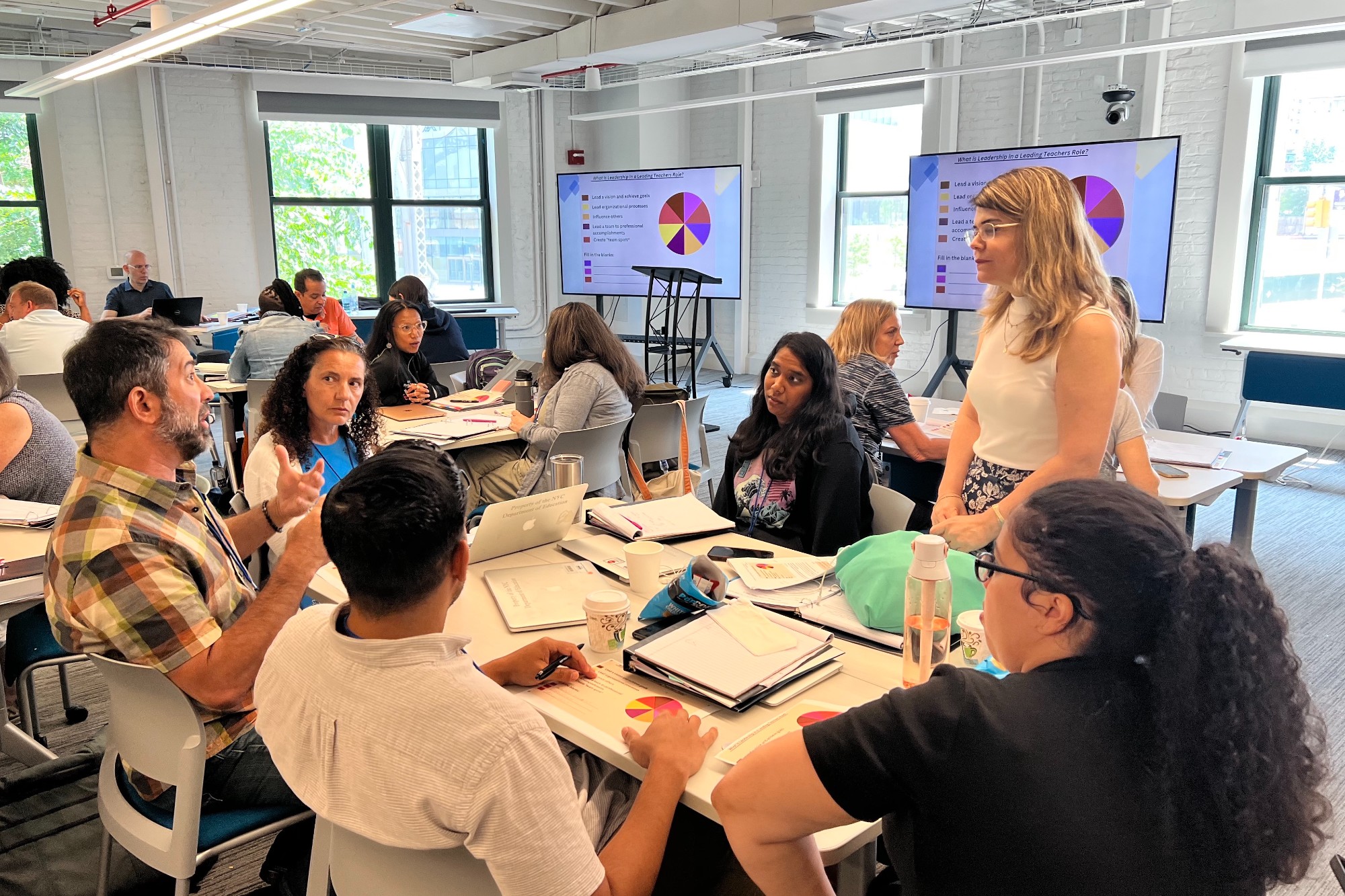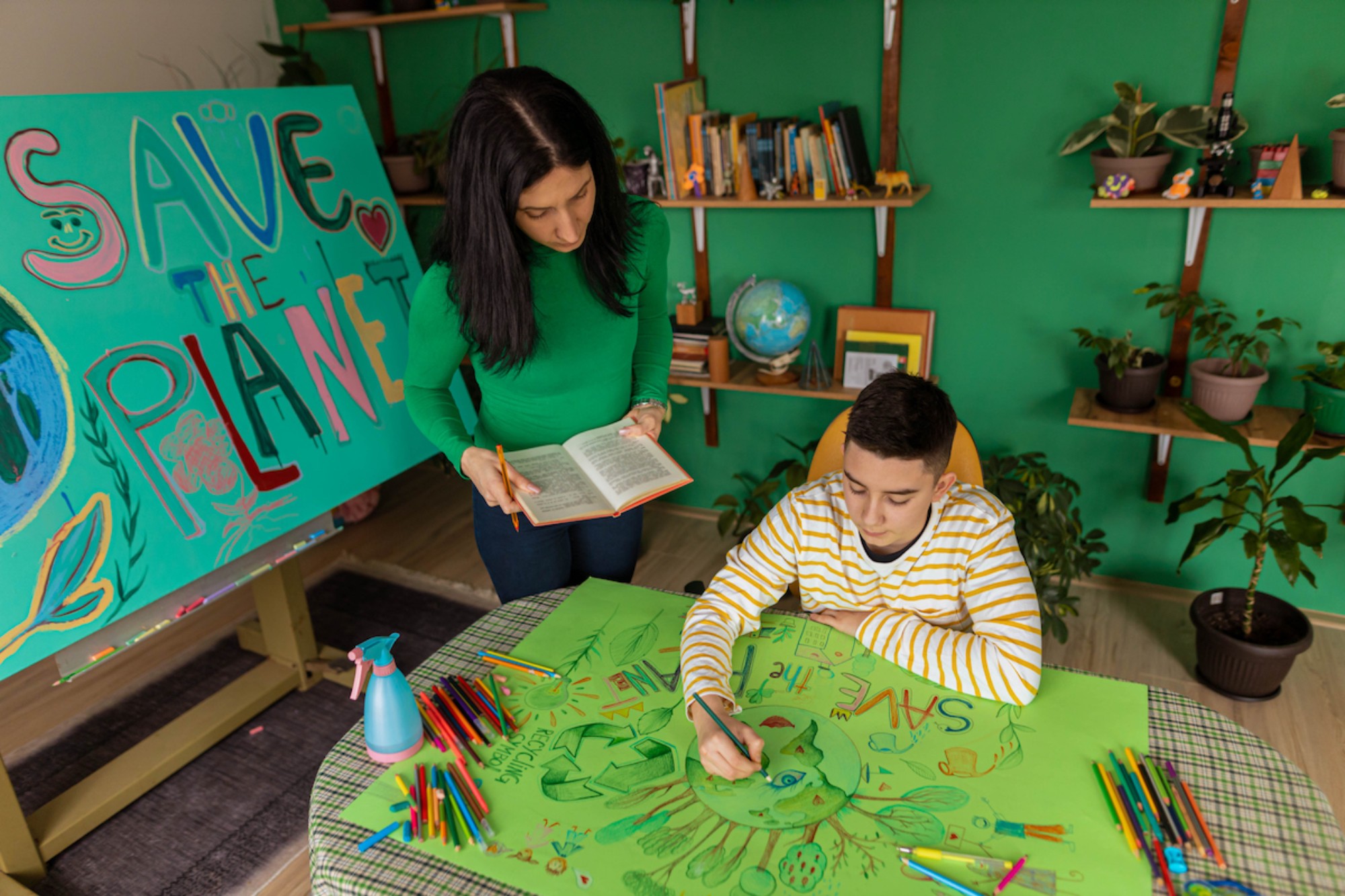From the devastating fire on Maui, to a rare California hurricane and Canadian wildfires causing dangerous air quality across the United States, the climate crisis is seemingly impacting North Americans more than ever in 2023. And while climate change policy currently rests with older generations, educating the youngest about climate change and paths to sustainability can pave the road to improvements in decades to come.
This summer at TC, Integrating Climate Education in NYC Public Schools provided elementary school teachers with the tools they need to feel confident teaching climate change to their students. The program was hosted by TC’s Center for Sustainable Futures (CSF), the LEAP (Learning the Earth with Artificial Intelligence & Physics) Center at Columbia University, and Office of Energy and Sustainability in the New York City Public Schools (NYCPS) and was funded by the National Science Foundation (NSF).
Forty elementary school teachers, who teach a variety of subjects, gained a deepened understanding of climate change, ways to engage students with climate change holistically, new connections with like-minded peers, and a bevy of resources on climate change and how to teach it.

(Photo: Ishwarya Daggubati)
“We are here as part of a global effort to address the most existential threat to society,” said Oren Pizmony-Levy, Associate Professor of International and Comparative Education and Director of CSF, in his welcoming remarks. “I want you to keep that in mind that what we're doing here this week is not only about the pedagogy and it's not only about getting the knowledge or the facts. It's about...how all of us together can help society address climate change.”
For LEAP, this partnership is a crucial part of the Center’s mission to advance climate data science and get accurate projection information to the people who need it most. By engaging with educators and “involving them in our journey to understand our planet's climate and look ahead with helpful data, we're fostering a generation that not only understands the importance of Earth's climate but actively participates in safeguarding its future," says Pierre Gentine, Director of LEAP and Professor of Earth and Environmental Engineering at Columbia University.
"We are thrilled to collaborate with Teachers College and LEAP on this innovative summer institute, perfectly in sync with Mayor Adams’ new strategic plan - Getting Sustainability Done. By equipping teachers with knowledge about climate change education, we're advancing our city's commitment to a greener and more resilient future," says Thaddeus Copeland, Deputy Director of NYCPS Office of Energy and Sustainability.`

(Photo: Ishwarya Daggubati)
TC experts from a range of programs—including International Comparative Education, Nutrition, Psychology and Science education to name a few—led lectures throughout the week to provide teachers the confidence to incorporate climate education into all subjects instead of just science.
KerryAnn O’Meara, Vice President for Academic Affairs, Provost, and Dean of the College, also noted the importance of the program, saying, “this Institute is here to say that we're all in this together and that teachers, students and their parents play a vital role in shaping the ideas and solutions” that can mitigate the damage of climate change.
The Institute was designed with input and collaboration from the ongoing Research Practice- Partnership with NYCPS Office of Energy and Sustainability. Using over seven years of research by CSF, the goals of the program were shaped by the concerns of NYC teachers. “It was really important to know what the barriers are and then to address them in the Summer Institute,” says Pizmony-Levy.
“Teachers said, ‘We don't know enough.’ We brought the scientists. Teachers say, ‘We don't feel comfortable.’ We made sure that we have sessions to really draw on their strength and capacity in other domains to bring it to climate. They said that they don't have materials. We're going to develop materials together.”
Teachers also provided questions about climate change that were used to prepare a workshop on climate science. That kind of consideration made it so that every participant learned something new or made new connections, regardless of how much they knew about climate change. Because climate change impacts all aspects of our lives, the institute made a point to connect climate education to subjects beyond science

(Photo: Ishwarya Daggubati)
Vicki Sando, who has taught students in Greenwich Village for over a decade, has been educating about climate change for many years but she was drawn to the institute because she wanted to deepen her knowledge. “As teachers, we're always looking to build on what we know as a foundation…And I wanted to interact with like-minded teachers.” The program provided her “renewed inspiration and energy to keep going” despite the challenges of climate education.
This coming year, Sando will be teaching students from pre-K through third grade, which poses special challenges for teaching climate change. “You don't want to scare them. You want to empower them,” she says, so learning age-appropriate ways to teach climate change was incredibly valuable.
Nicolas Linares, a paraprofessional at a school in East Elmhurst, echoed similar sentiments. As an environmentalist, Linares is deeply familiar with climate change and, typically, focuses on its negative impacts when teaching because of how urgently we need solutions. However, throughout the week his mindset changed. “I understand now that I have to create hope…if we balance those two feelings [hope and urgency], we can have better outcomes for the children,” he says.

(Photo: Ishwarya Daggubati)
This coming year as he continues his work supporting teachers and students, Linares will focus on finding ways to “plant hope in these difficult times” and creating spaces, like the school garden, where children are encouraged to dream about a better future.
For Oré Adelaja, a teacher in East New York who is passionate about environmentalism but hasn’t taught climate change before, the most valuable aspect of the summer institute was idea-sharing with the other participants. “One of the greatest wealths of being a teacher is each other,” says Adelaja. “So the most impactful thing for me was learning things I can implement within the classroom.” She was inspired hearing about what kind of climate education initiatives were used in other schools that she could adapt for her own classroom, like using seed bombs to plant native flora.
While learning about methods to implement climate education throughout the year, Adelaja was shocked to learn about environmental racism, something that directly impacts herself and the students she works with. The revelation that environmental racism is the likely reason for why a Department of Sanitation facility is in her school’s neighborhood instead of a wealthier one informed Adelaja’s lesson plan, which will have students comparing resources in their neighborhood to another.
For Pizmony-Levy and his team, which includes TC graduate students Christina Torres (Ph.D candidate, Science Education) and Noa Urbach (Masters student, International and Comparative Education), the institute held earlier this summer is just the beginning. Not only are there three more annual institutes planned, but there will also be long term support for teachers, building their capacity to educate and inspire the next generation of climate change leaders.
